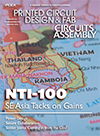Jersey City, NJ, Nov. 29, 2004 - Cookson Electronics Assembly Materials and Automated Learning Corp. (ALC) have launched a series of lead-free assembly training courses.
The courses are part of ALC's Learntech series, a modular interactive multimedia learning approach designed for process engineers, managers and senior operators involved in the implementation and management of lead-free electronic assembly processes.
Business Electronic Soldering Technologies (BEST) is a key contributor in the first product in the suite -- Lead-Free Soldering: Orientation. Click here for more information.
Future lead-free training courses will cover rework, wave soldering and SMT. Translated versions will be offered in German and Chinese.
Munich, Nov. 30 - The electronica trade show in Munich earlier this month attracted more than 3,000 exhibitors and 75,000 attendees, according to event organizer Munich Trade Fairs International. These numbers are almost equal to those released regarding the last show in 2002.
Overall feedback was positive; 85% of exhibitors and attendees surveyed assessed the market's future as "excellent to good."
Non-German attendance rose 10% from the previous show, making up 42% of total visitors. According to the organizer, 86% of attendees were identified as decision-makers for their companies.
"We spent quality time with customers in a relaxed atmosphere here at our booth," said Alden Chauvin, VP of worldwide sales for Intersil, a manufacturer of high performance analog solutions. "We've had meeting after meeting and business has been great, which is no surprise at electronica."
The next electronica will take place Nov. 14-17, 2006, at the New Munich Trade Fair Centre.
Minneapolis, MN -- The SMTA has issued a call for papers for the next SMTA International event, to be held in conjunction with AT Expo on Sept. 25-29, 2005, at the Donald Stephens Convention Center in Chicago. A 300-word abstract should be submitted online by Feb. 7.
Papers are sought in the following technology tracks: assembly; business; components; emerging technologies; PCB technology; and process control
New topics for 2005 include New Materials & Processes, Battery Interaction, Lead-free Case Studies, Doing Business in Asia and RoHS Compliance. A full list of topics can be found on the SMTA Web site.
IC Insights, a research firm, today forecast the 2004 ranking of the top 10 semiconductor suppliers, with Intel leading the way, surpassing $30 billion in semiconductor sales. However, the company is expected to register only 11% growth this year, and a 3.4% CAGR over the 1999-2004 timeframe, compared to an industry-wide 6.9% average.
Number two is Samsung, followed by Texas Instruments, Renesas and Infineon.
Driven by surging DRAM and flash memory sales, Samsung's semiconductor revenue (85% of which is memory) is forecast to grow 53% in 2004. Infineon is forecast to jump from seventh in 2003 to fifth in 2004, aided by the strength of the euro. In euros, Infineon is expected to register a 24% growth rate (35% when its sales are converted into U.S. dollars).
The rest of the top 10 include Toshiba, STM, TSMC, NEC and Freescale. Excluding TSMC, which is a pure-play foundry, Philips would come in at no. 10.
The top 10 semiconductor companies revenues are forecast to grow 24% over 2003. In contrast, the worldwide market is forecast to grow 28%. Of the top 10, including TSMC, only four are forecast to grow faster than the total market in 2004. Excluding TSMC, only three top 10 companies are expected to increase their 2004 sales faster than the overall market growth rate.
Weymouth --On Nov. 25, DEK held a Stencils Technology Day at its Weymouth, UK, office to share the findings from its recent lead-free print trials, and to provide hands-on experience with stencil technologies.
Clive Ashmore, global applied process manager, presented the lead-free trial results. The company found that having a stencil that is well designed and specified for its application has the greatest impact on process performance, whether the application is lead-free or leaded. A second important consideration is materials composition. Electroformed nickel was the top performing stencil material in tests, closely followed by laser-cut nickel.
Richard Boyle of Henkel Multicore then gave a presentation on lead-free pastes that focused on areas where the differences between leaded and unleaded may impact the industry most.
The afternoon was dedicated to workshops and discussions on the theme "Print failures: cause and effect."
Dek reported positive feedback from the 32 customers in attendance.
SAN JOSE, Nov. 22 -- The 90-day moving average for orders of semiconductor equipment from North American manufacturers rose 3% over revised September levels and 60% year-on-year, the industry trade group SEMI said today.
Respondents to SEMI's monthly poll posted $1.39 billion in orders in October. The book-to-bill ratio was 0.96, meaning that $96 worth of orders were received for every $100 of product billed for the month.
The three-month average of worldwide billings was $1.44 billion in October, flat with revised September levels and up 67% versus a year ago.
The industry is flux, SEMI said in a statement. "The overall semiconductor equipment sector will post the second greatest gain on record in 2004. It is also several months into a period of order softening," said Stanley T. Myers, president and CEO.
"Total equipment bookings for North American producers have declined 13% from the cyclic peak observed in June. Given recent announcements from several equipment companies, continued moderation in orders is expected until end market visibility strengthens for the semiconductor manufacturers."
Press Releases
- Yamaha reveals software innovations to boost printing, mounting, and intelligent factory
- Innominds Partners with SIIX to Deliver Full-Stack ODM services for Intelligent Device-to-Cloud Solutions
- Phil Zarrow to Host SMT Bootcamp at BEST Inc. on October 15-16
- HyRel Technologies Showcases Summer Intern Success Through Hands-On Innovation


